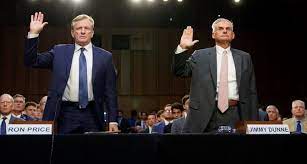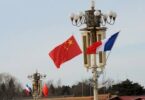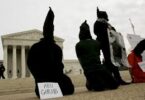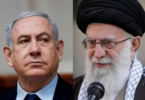Jason D. Greenblatt
At what point do Americans get to ask members of the US Congress why they keep spending our hard-earned money on political gamesmanship? In June, the PGA Tour, DP World Tour and Saudi Arabia’s Public Investment Fund, which owns and operates LIV Golf, shocked the sports world when they announced their merger.
There has been strong criticism of the merger from some in the US. One complaint is that the negotiations were shrouded in secrecy. But for anyone who has ever conducted a complex, sensitive transaction, secret negotiations are no surprise at all. In business, announcements are often made only after a deal is completed, not before. Another criticism, this one leveled at the PGA, is that the PGA has abandoned the 9/11 families it brought in to help in the fight against LIV Golf to begin with. That is totally fair, but does this mean the PGA is forever frozen into the positions it took a year or more ago, when the PGA wanted to shut down LIV Golf? The PGA made a big mistake in using 9/11 families in its fight with LIV Golf to start with. To involve the sport of golf and entities which were not established or in power back then was a political move, one made at the expense of families who have suffered enough.
It is understandable that the reversal is bitterly disappointing to these families, but ultimately the PGA realized it would lose its fight with LIV Golf and made the choice to stay alive. Then there is the “sportswashing” claim. If you follow that claim to its logical conclusion, we would have to end relationships with many countries around the world. Imagine what that approach would do to the US economy. Just for context, US trade with China exceeds $690 billion.
Moreover, the eye-popping reforms being implemented in Saudi Arabia are having an incalculable, positive impact on Saudi citizens and residents, the broader Middle East and beyond. This should be encouraged, not discouraged. We should remember that, only a few years ago, we were criticizing Saudi Arabia for not being more open, for not allowing women to compete in sports and for not doing enough to stand up to extremist agendas, among other criticisms. The same arguments apply to those criticizing the deal because of what they say are human rights issues. Do we expect Saudi Arabia and all of our friends and allies to be just like America before we do business with them? Of course not. We must engage with them and seek to keep improving things. But we do not cut ties because there is real work to be done. We should recognize that there has been and continues to be real work being done on that front in the Kingdom.
If the sportswashing and human rights activists are consistent with their arguments, they would likely demand that we stop every deal between the Kingdom and the US. That would include the $37 billion deal the Kingdom and Boeing recently inked, the tens of billions of dollars PIF holds in US stock, and the more than $55 billion of trade and investment between the US and Saudi Arabia, to name just a few. What do these activists think stopping this activity would do to the US economy, and to US jobs? Which brings me to the criticism coming from Capitol Hill. Last week, the Senate Homeland Security Committee’s Permanent Subcommittee on Investigations held a three-hour hearing on the PGA Tour’s planned merger with LIV Golf.
The chairman of the panel, Sen. Richard Blumenthal, a frequent critic of Saudi Arabia, voiced the most criticism. Blumenthal dressed up his disdain for the Kingdom by couching the transaction in “national security terms.” He added that the hearing was about much more than the game of golf, which he described as a “cherished American institution.”
Golf is certainly popular in the US. According to the PGA, roughly one in seven Americans played golf in 2022, resulting in $101.7 billion in direct economic impact. But is golf so cherished that we will sportswash away its dirty little secrets? The Masters Tournament, first played in 1934, did not invite a Black competitor until 1975. The famed Augusta National did not admit its first Black member until 1990 and membership to women was not available until 2012. For many years, neither Blumenthal nor I, both Jewish Americans, would have been allowed to be members of Augusta National. Imagine if, during those years, US allies and partners had limited investment from America or stopped working with the country because of those policies or any US government policies they disagreed with. Imagine the impact on the US economy and our national security if our allies and partners wanted to cut business ties and investment over various American policies today.
We should approach foreign policy with humility and, most importantly, acknowledge that we are not perfect ourselves. We are all a work in progress and always will be. We should use business opportunities, sports, culture, tourism and other ties as a way to discuss our differences with an outstretched hand and open heart, and use those opportunities to build bridges and bridge gaps.
If Blumenthal has an actual national security concern, he should articulate it. I heard no such concern articulated. The Kingdom’s transformation is too important for the national security of the US and the people of Saudi Arabia, and Congress should be strongly supporting our ties, not discouraging them. Investigations like this will have a chilling effect on foreign investment in the US. The investigation is a waste of American taxpayers’ money and our senators’ time would be better spent on real issues that affect the US. Sadly, there are many of those today.







